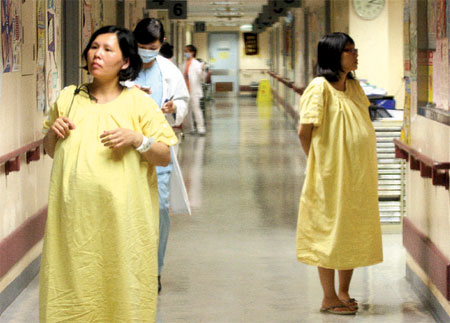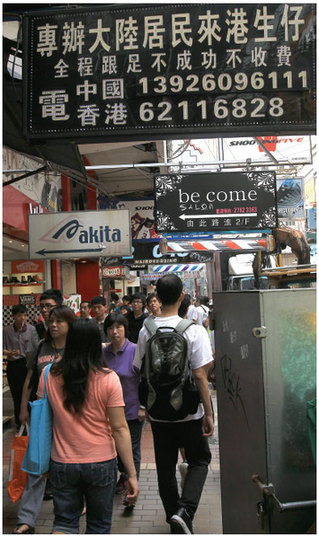The maternity ward sweepstakes
Updated: 2011-07-27 07:34
By Michelle Fei(HK Edition)
|
|||||||
|
Two mainland expectant mothers wander in the Kwong Wah Hospital in Kowloon. Many mainland mothers-to-be pay tens of thousands of Hong Kong dollars to middlemen to buy the limited delivery quota. Photo by Edmond Tang |
|
Billboards advertising middlemen services can easily be spotted in Mong Kok. These agencies make money by helping mainland expectant mothers grab a ward at Hong Kong hospitals. Photo by Edmond Tang |
Despite assurance of Hong Kong authorities that the number of expectant mothers coming to city hospitals will be sharply limited next year, several so-called middlemen agencies give equal assurance that they can get around the problem. Michelle Fei reports.
They're like the weeds that pop up in the back yard - flourishing, unwanted by authorities on this side of the border - the gray industry that arranges for mainland women to come to Hong Kong to have their babies. They are known as "the middleman industry". They continue to survive despite the determination of Hong Kong to limit the number of mainland women coming here to give birth and to crack down on the "middleman" intermediaries.
"All-in-one service package", or "100 percent success rate guaranteed", proclaim banners on fliers posted in border districts like Luohu and Futian. Anyone may think what these companies are doing is completely legal.
In Hong Kong's Mong Kok, vividly among other signs announcing professional services, eye-catching advertising boards, hawk "professional service in helping mainland women to delivery in Hong Kong".
Expectant mothers from the mainland, in the final stages of pregnancy, can be seen here frequently. They come to stay in so-called mother hostels arranged by the agencies. Living condition in these hostels is described as cramped and humbling.
A similar picture unfolds in the cyber world. There are tens of thousands of websites for agencies that arrange maternity care and online discussion forums, involving thousands of mainland mothers, mothers-to-be and middlemen. The topic of conversation is the same, discussing tactics and countermoves against the new, tighter policies of the Hong Kong government to restrict the number of pregnant mainland mothers occupying bed space in Hong Kong hospitals.
No official statistics on the revenues of these agencies are available. But the frenetic activity suggests that the business is doing well.
The price for arranging a ward for an expectant mainland mother has already increased sharply. It went up to around HK$20,000 right after the Hong Kong government capped the number of beds for mainland mothers for 2012.
The policy set out by the SAR government was intended to ease pressure on facilities at local maternity wards and guarantee service to pregnant women from Hong Kong. Like it or not, the harsh reality is that the SAR's tightened policy has done little to curb the activities of the middlemen agencies. It simply gave the agencies an opportunity to raise their rates.
And they've changed their pitch to expectant mothers: "The Hong Kong government had limited the wards. Hurry up." This kind of promotional slogan is often used by agencies these days.
Here are some others: Special service was designed for the war for wards - the "emergency ward booking service".
Online enquiries to a Shenzhen-based agency, Maternal and Child Health Po Hong Kong Ltd, uncovered that "emergency ward booking service" was designed for expectant mothers approaching to delivery date and keen to grab a ward in Hong Kong hospitals in 2011 or in early 2012.
These targeted customers were women at least five months into their pregnancies. They also form the group most likely to be refused entry to the SAR. Officers will simply assume that their reasons for entering Hong Kong are to deliver their babies here.
"We are experienced in transferring women with big stomachs cross the border. So far we never failed," a staff member of the Maternal and Child Health Po Hong Kong Ltd told China Daily where a journalist sent an enquiry saying she was seven months into pregnancy.
The agency said it charged 8,000 yuan (HK$9,638) for cheating customs and getting the mother-to-be across the border. The agency refused to reveal details of how this feat is accomplished.
The agency charges 100,000 yuan (HK$120,000) to reserve a ward in late December 2011 at Hong Kong private hospitals, 18,800 yuan (HK$22,650) for the agency service and another 70,000 yuan (HK$84,337) to 80,000 yuan (HK$96,385) for the maternity service which the agency claimed went to the hospitals. The total cost for giving birth at Hong Kong in late 2011 would be around HK$210,000, according to the agency.
Noticeably, the charge for standard, spontaneous birth package at Hong Kong Baptist Hospital, which deals mainly with expectant mothers from outside the community, was only HK$20,880, including three nights' stay. Thus, the agency charge was ten times higher than the cost would be if the woman made her own hospital arrangements.
Clearly, agencies would never be the first option for any expectant mother, especially since the services are risky and even outright illegal. Why do expectant mothers choose them at all?
"The agencies and these discussion zones are kind of helpful for me. I could not have so much information or be aware of so many experiences without their help," said a mainland woman surnamed Zhou who just had her baby in Hong Kong in early April. She had sought help from a Shenzhen-based agency.
Zhou, who lives alone in Beijing, found herself pregnant after broke up with her boyfriend.
"I felt helpless and lonely. I was ashamed to turn to my friends in Beijing for help, or dare to tell my parents. The Hong Kong agency turned out to be my only support," said Zhou. She paid an extra HK$100,000 for the "support" of getting her a ward at the Baptist Hospital.
Zhou's case may not be widely applicable. There does seem a trend, however, of mainland women showing a willingness to pay extra money to obtain "inside information", cutting queues and getting "support" from such agencies.
Agencies claim special relationships which permit them virtually to declare themselves as "omnipotent".
"We have special 'cooperation' with doctors at Hong Kong private hospitals that we are quite sure to arrange you a bed at Hong Kong private hospitals," said Miss Xuan, a staff member of the Maternal and Child Health Po Hong Kong Ltd in response to a China Daily reporter posing as an expectant mother.
That promise came on the same day the Hong Kong government announced that the number of obstetric ward places given to expectant mothers from the mainland was to be cut sharply to 34,400 in 2012. The new ceiling represented a reduction of 10,000 from 2011.
At least the first 20 agencies returned from a search on Baidu, the major search engine for mainland residents, claimed they were "confident" of "cutting the queue for mainland mothers" and eventually "getting a ward" no matter how much tighter the restrictions seemed to be.
Additionally, the agencies had also expanded their service chains. The so-called all-in-one package service now covers all stages from prenatal education, arrangements related to delivery, even to postnatal issues such as purchasing baby formula, education of children's at Hong Kong until they are three years old.
The widely known "expectant mothers' hostel" at Mong Kok, for example, was one "new product" in the chain.
"We are quite tied up with our business and we don't have friends in Hong Kong to help me with my young boys' Hong Kong visa renewal. I kept in touch with the agency that arranged the delivery and they are still helping now," said Mrs Chen, a resident of Zhejiang province who gave birth to twin boys in Hong Kong.
Despite how "helpful" or how "omnipotent" agencies pretend to be, the fundamental question still remains: are they legal?
In terms of the nature of the agencies, most of them register as "consulting company", representing themselves as "legal information provider", even though the information entail disclosing ways to take advantage of loopholes in the Hong Kong system or outright cheating the Hong Kong government.
"It's hard to define whether the agencies are legal or illegal. We can only judge them by specific moves rather than the 'package service' as a whole," said legislator Wong Kwok-kin, who is also chairman of the Hong Kong Federation of Trade Unions and a member of the Democratic Alliance for the Betterment and Progress of Hong Kong.
Wong cited the example of women with advanced pregnancies who would be virtually certain to be rejected by customs if they attempted to enter Hong Kong. If agencies help these women cross the border by escaping the scrutiny of customs officers, the agencies commit an offense.
Wong was concerned however that there were no laws relating to "mother hostels" in the Mong Kok.
"Hong Kong does not have a specific law to regulate the middleman industry. Thus it's hard to regulate and punish them," said Wong.
"Even though we know that they cut the queues, and they may have made inappropriate deals with local doctors, the only thing we can do is to give them moral condemnation," Wong said.
"The only way to cut off the business is to urge local doctors to stay away from temptation and behave themselves. Without the help of the doctors, they could do nothing," said Wong.
Phone calls to local private hospitals elicited the same answer - no cases have surfaced of doctors taking extraordinary payments from agencies to accommodate expectant mothers from the mainland. None however would speculate as to how agencies are able to claim "special relationships" with Hong Kong doctors - of how expectant mainland mothers have been allocated ward space without going through official channels.
"The crux of the problem is the clash between Hong Kong's limited medical resources and the ever-growing demand from both the local and the non-local market. The fundamental way to solve the problem, or to kill the gray middlemen industry, is to improve the capacity of the city's medical services system by building more hospitals and providing more wards. If that were the case, expectant mothers could all enjoy the services without turning to the middlemen," said Wong. The legislator admitted that chances for the SAR to set up such a law to regulate such agencies were low.
Considering possible bribery cases involving local doctors, the Department of Health had already declared "we will take legal action if any breaches be founded .Private hospitals have had consulted ICAC on the matter."
(HK Edition 07/27/2011 page4)

